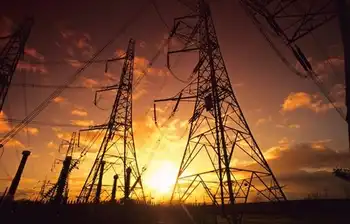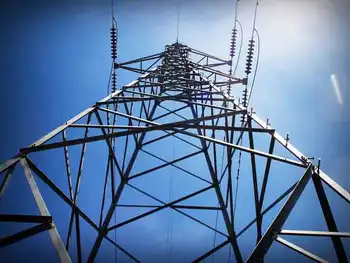- Nova Scotian electricity consumers could face double-digit prices hikes if the federal government bungles implementation of the Kyoto accord, the head of province?s power utility said Wednesday.
Emera Inc. president David Mann told a Halifax business audience that the federal government's rush to ratify the accord has left the public and private sectors scrambling to find solutions around an extremely difficult and complicated issue. That has Nova Scotia Power Inc., which is owned by Emera, groping in the dark on how best to plan for the new rules, said Mann, guest speaker at a Metropolitan Halifax Chamber of Commerce luncheon. "We have the basis of a plan (but) because there is so much uncertainty around Kyoto, we don?t really have enough information to put in place anything very definitive," he said. "The targets are hanging out there; they seem to change from time to time." Cut greenhouse-gas emissions Under the protocol, Canada would commit itself to cutting its greenhouse-gas emissions six per cent by 2010, down from 1990 levels. That?s about 240 megatonnes a year of the emissions suspected to cause climate change. Among the unknowns, Mann said, is whether the federal government will force one industrial sector " such as fossil-fuel-consuming electricity producers" to bear most of those reductions. "If someone took the position that the biggest bang for our buck would be to target the electricity sector ... clearly that would be a very onerous situation for us," he said. Increased costs could include either the conversion of existing coal-fired plants to burn cleaner, or the far more expensive task of constructing entirely new plants. Mann said Nova Scotia Power could also be forced to buy carbon credits from other Kyoto member countries, mostly those in the less developed world. And that cost would be passed on to consumers, he said. It's hard to speculate, but suffice it to say prices will go up as we begin to grapple with the environmental issues,he said. How much electricity prices would rise depends on how fast, and how far, the federal government is prepared to go to meet Canada?s Kyoto commitments, Mann said. Price shock If implementation is done badly, consumers could be hit with a "price shock" greater than 12 per cent per year or more. The federal government has had some preliminary discussions with the Canadian Electricity Association on what the sector might expect under Kyoto, but Mann said there has been little information forthcoming. Although Canada has ratified Kyoto, the accord still needs to garner the votes of countries that generate at least 55 per cent of the world's total greenhouse-gas emissions. But Mann said even if the accord itself dies, the power company knows its goals are now part of the business landscape. We recognize the status quo is not acceptable, he said. There is no going back. More than 70 per cent of Nova Scotia?s electricity is generated from coal, a percentage that Mann said is not likely to change in the near future, despite the addition of new fuels, such as natural gas and wind power. "The science (of clean coal burning) is not all that far off. The economics, of course, is an entirely different issue."
That has Nova Scotia Power Inc., which is owned by Emera, groping in the dark on how best to plan for the new rules, said Mann, guest speaker at a Metropolitan Halifax Chamber of Commerce luncheon.
"We have the basis of a plan (but) because there is so much uncertainty around Kyoto, we don?t really have enough information to put in place anything very definitive," he said.
"The targets are hanging out there; they seem to change from time to time."
Cut greenhouse-gas emissions
Under the protocol, Canada would commit itself to cutting its greenhouse-gas emissions six per cent by 2010, down from 1990 levels. That?s about 240 megatonnes a year of the emissions suspected to cause climate change.
Among the unknowns, Mann said, is whether the federal government will force one industrial sector " such as fossil-fuel-consuming electricity producers" to bear most of those reductions.
"If someone took the position that the biggest bang for our buck would be to target the electricity sector ... clearly that would be a very onerous situation for us," he said.
Increased costs could include either the conversion of existing coal-fired plants to burn cleaner, or the far more expensive task of constructing entirely new plants.
Mann said Nova Scotia Power could also be forced to buy carbon credits from other Kyoto member countries, mostly those in the less developed world.
And that cost would be passed on to consumers, he said.
It's hard to speculate, but suffice it to say prices will go up as we begin to grapple with the environmental issues,he said.
How much electricity prices would rise depends on how fast, and how far, the federal government is prepared to go to meet Canada?s Kyoto commitments, Mann said.
Price shock
If implementation is done badly, consumers could be hit with a "price shock" greater than 12 per cent per year or more.
The federal government has had some preliminary discussions with the Canadian Electricity Association on what the sector might expect under Kyoto, but Mann said there has been little information forthcoming.
Although Canada has ratified Kyoto, the accord still needs to garner the votes of countries that generate at least 55 per cent of the world's total greenhouse-gas emissions.
But Mann said even if the accord itself dies, the power company knows its goals are now part of the business landscape.
We recognize the status quo is not acceptable, he said. There is no going back.
More than 70 per cent of Nova Scotia?s electricity is generated from coal, a percentage that Mann said is not likely to change in the near future, despite the addition of new fuels, such as natural gas and wind power.
"The science (of clean coal burning) is not all that far off. The economics, of course, is an entirely different issue."
Related News

How IRENA Study Will Resolve Philippines’ Electricity Crisis
MANILLA - The reason why IRENA made its study in the Philippines is because of the country’s demand for electricity is on a steady rise while the generating capacity lags behind. To provide households the electricity, the government is constrained to implement rolling blackouts in some regions. By 2030, the demand for electricity is projected to reach 30 million kilowatts as compared to 17 million kilowatts which is its current generating capacity.
One of the country’s biggest conglomerations, San Miguel Corporation is accountable for almost 20% of power output. It has power plants that has a 900,000-kW generation capacity. Another corporation…




